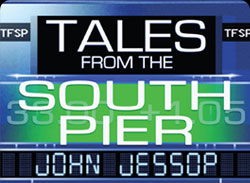This past Saturday, on a typically grey and chilly December afternoon, the Twickenham faithful dutifully showed up expecting to watch their team receive a stern lesson from the mighty All Blacks. They left in euphoric shock, having seen the anticipated roles reversed.
Overseas readers may require a translation, which I’m happy to provide.
It means that a young and inexperienced England rugby team, which on the previous two Saturdays, at the same Twickenham stadium, had succumbed rather abjectly to the other two Southern Hemisphere teams, Australia and South Africa, suddenly found the wherewithal to defeat mighty, all-conquering New Zealand – world champions, winners of their last twenty games, and regarded as virtually unbeatable – by the improbable margin of 38-21.
The reversal in the respective fortunes of the two teams, supposedly so far apart in skill and guile that the outcome was written off by most commentators as another English drubbing, has yet to be explained. The pundits will try anyway, but they will surely fail. The video recordings will show that England managed, on this particular day, and for reasons about which one can only theorize, to purloin all the attributes that had made their opponents so formidable: speed, strength, commitment, and that most un-English of virtues, flair. The local no-hopers, supposedly enfeebled by their two previous losses, simply played out of their skins. The All Blacks left theirs in the dressing-room.
How such a dramatic transference of form came about is beyond comprehension. Nobody saw the wallet lifted. But then the whole attraction of sporting contests is that results are never a foregone conclusion – unless they are rigged, which in rugby, as distinct from some other sports, it happily remains unthinkable. Sporting upsets may be rare but they happen often enough to qualify as a cherished tradition. And not a single one has been adequately explained.
The shock on the Twickenham terraces on Saturday was palpable, the collective gape-mouthed wonder amusing to behold. It is an endearing English trait always to expect the worst, to soften the blow of disappointment, which makes the best, when it occurs, all the more gratifying.
Soon after the start of Saturday’s game, when it became apparent that England’s players, with nothing to lose but their pride, were up for a gut-spilling rumble, the normally reserved Twickers crowd happily broke into its familiar, and unlikely, rugby anthem, Swing Low Sweet Chariot (a song we would once have called a Negro spiritual but which must now, presumably, be referred to as an African-American devotional hymn). They lifted their voices with all the panache and gusto of a Baptist choir from Beloxi, Mississippi, and kept at it right up to the final whistle, when even throats lubricated with vast quantities of ale were parched.
I would like to have been there, on what the sports writers will forever call a ‘famous occasion’, but I’m content in the knowledge that television showed more, much more of the drama than I would have observed from a lofty seat in the stadium.
Reading about it in the newspapers this frosty Sunday morning has been as heart-warming as the breakfast porridge – if nothing else a welcome relief from the interminable analysis of the Savile, BBC and Leveson affairs.
In troubled times, and in the bleakness of an English Winter, there is nothing like an occasional sporting triumph to lift the spirit.
I shall soon have my wife complaining, “How many times can you watch the same bloody game?”
The answer is, “Just a few more, dear, just a few more.”


Be First to Comment